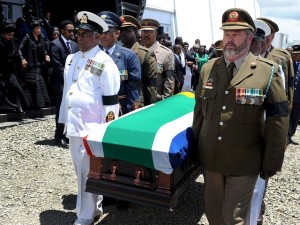The death of Nelson Mandela shook the world. Why it did would probably have as many reasons as the stars in the sky. A plethora of research organisations would probably need a work force the population of half of Europe to conduct in sufficient quantum what Mandela truly meant as a person and as a philosophy of quintessential African tradition and culture.
The reasons given would be so diverse and yet the commonality of each would reverberate with so many people that you would want to think why he didn’t live in as big a palace as Buckingham, why he didn’t have as much wealth as the monarchs of the middle east, why his cough and groans and meals was not reported daily like the ultimate cream of the show biz personalities, until the world knew he was ill.
Yes, news of his failing health made the rounds in real time and the world gasped at the reality of a possibility – that he was man and would not leave forever. While the world held its breath and news of his treatment and recuperation flirted with every media round the world, sickness and death wore a different garb. It wasn’t that sickness was new to the young, middle-aged, and old. In fact, as winter approached every year, NHS and government campaigns would be stepped up announcing discounts and relief measures on power for aged households, flu jabs, etc. Not that these elders in society were less honourable for the dotting but that honour itself had moved residence to Mandela’s quarters – an aura of décor had enveloped him rather than his mere household such that were he to live in an igloo, it would glow with warmth from every quarter of the earth.
But he had retired quietly for the remaining glorious moment that the world would gladly deny him if they could. Oh, the selfish thoughts of men proving more selfish for that which they would have they may say they have it. It was becoming the challenge of love – pitching the love of success against an individual’s humanity. Much the same I would were my loving father alive to give me notice of his impending death. If banks are broken to pay for a cure to death then I would gleefully undertake the journey of the quintessential hunter to the forest of a thousand demons (Ogboju Ode ninu Igbo Irunmale) or should it be the Grecian hunt for the golden fleece.
Yes, he had retired. But was he tired? Tired after a long and tortuous incarceration, tired of the denial of all joys of normalcy that he looked to find joy every second of the remainder of his life, tired of all the running from the guerrilla carpeting, boundary crossings, prisms of prison, to the loss of the people who soldiered with him and left him alone to pray over many graves as if he was never going to join them. But was he tired? Perhaps the world would never know. It would be no use saying. He was father to them all.
So in the quiet of the world media, night took its course lulling everyone to sleep as death stole in as if men were not on guard. But while his family took their turns and gathered to record the last minutes in their memory, Mandela sailed away to rest and the media woke from their slumber. He had become popular once again, in death. As if he would never die. As if he ought not to die. As if the lessons he spent his life teaching would now be certificated. As if we knew what he wanted and were reluctant to give it. As if we knew that he should never die even though we couldn’t keep him.
But he died. And we were shaken – by death or the lessons of his death.
Comets of Comments
How many comets were seen upon the death of Nelson Mandela berthing the earth announcing that even nature was aware that a soul had left the world the world, I would not know; and if any was not seen either, I probably still would not know. It was never reported. But what was reported are the comets of comments made by various people about the man. Perhaps if the South African government would consider these quotes as epitaphs on the basis of quality, office, and relationships, of those who gave them, Madiba’s grave might suffer abuse of being considered a tabloid for a grave stone. \
But read some of the comments below:
Prince Charles said he was “the embodiment of courage and reconciliation. He was also a man of great humour and had a real zest for life”
Jacob Zuma, South African President: “Let us recall the values for which Madiba fought. Let us reaffirm his vision of a society in which none is exploited, oppressed or dispossessed by another.”
Prime Minister David Cameron: “A great light has gone out in the world. Nelson Mandela was a hero of our time”
Deputy Prime Minister Nick Clegg: Nelson Mandela will be mourned and missed on every continent around the globe.”
US President Barack Obama: “He no longer belongs to us. He belongs to the ages.”
Former Prime minister John Major: “He left an indelible mark on his time that few have ever equalled.”
Former President George Bush: “President Mandela was one of the greatest forces for freedom and equality of our time.”
Myanmar Opposition Leader, Aung San Suu Kyi: “He made us all understand that nobody should be penalised for the colour of his skin, for the circumstances into which he is born.”









